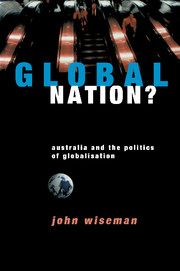Book contents
- Frontmatter
- Contents
- Abbreviations
- Acknowledgments
- 1 Introduction: Australia and the Politics of Globalisation
- 2 Breaking the Spell? Understanding Globalisation
- 3 Transforming the Global Economy? Trade, Capital and Power in the Late Twentieth Century
- 4 Onto the Global Racetrack? Globalising the Australian Economy
- 5 The Price of Competitiveness? The Social Impact of Globalisation on Australia
- 6 Wired to the World? Australia and the Globalisation of Media and Information Technologies
- 7 Nowhere to Hide? Australia in the Global Environment
- 8 Where in the World? Transforming Australian Political Relationships and National Identities
- 9 Alternative Strategies? Thinking and Acting Globally and Regionally
- 10 Alternative Directions? Thinking and Acting Locally and Nationally
- 11 Conclusion
- Notes
- Bibliography
- Index
10 - Alternative Directions? Thinking and Acting Locally and Nationally
Published online by Cambridge University Press: 20 May 2010
- Frontmatter
- Contents
- Abbreviations
- Acknowledgments
- 1 Introduction: Australia and the Politics of Globalisation
- 2 Breaking the Spell? Understanding Globalisation
- 3 Transforming the Global Economy? Trade, Capital and Power in the Late Twentieth Century
- 4 Onto the Global Racetrack? Globalising the Australian Economy
- 5 The Price of Competitiveness? The Social Impact of Globalisation on Australia
- 6 Wired to the World? Australia and the Globalisation of Media and Information Technologies
- 7 Nowhere to Hide? Australia in the Global Environment
- 8 Where in the World? Transforming Australian Political Relationships and National Identities
- 9 Alternative Strategies? Thinking and Acting Globally and Regionally
- 10 Alternative Directions? Thinking and Acting Locally and Nationally
- 11 Conclusion
- Notes
- Bibliography
- Index
Summary
[The world still] has more depth than a global network of economic power extending from the centre(s) to the periphery … To problematise the coherence and durability of national societies and states, however, does call for new ways of thinking about the way that social space is organised and reorganised over time.
Rianne MahonWhile it is increasingly unlikely that a territorial unit can continue to preserve its distinctiveness on the basis of delinking there is an increasing probability that distinctive identities may be formed as a unique crossroad in the flow of people, goods and ideas.
Z. MlinarThis chapter addresses the possibilities and limitations of local and national responses to globalisation. It begins by arguing that the re-imagining and recreation of local community identities and relationships has become more important than ever. The processes of globalisation have brought about and been affected by changing forms of localisation and the reshaping of relationships between the individual, the family, the household and the community.
Localism is a politically ambiguous principle with sectarianism and prejudice often on the other side of the coin to self-determination and diversity. New forms of aggressive tribalism, prejudice and intolerance are readily visible, but so too are many struggles to sustain the economic viability of local communities and respect the diversity of local cultures.
Struggles to maintain a diversity of social and economic relations are vital if empowerment is understood as a process of ‘promoting, preserving and engaging the diversity of expertise; it means promoting innovation through localised, poly vocal activity, and the active use and solicitation of indigenous lore’.
- Type
- Chapter
- Information
- Global Nation?Australia and the Politics of Globalisation, pp. 131 - 148Publisher: Cambridge University PressPrint publication year: 1998

